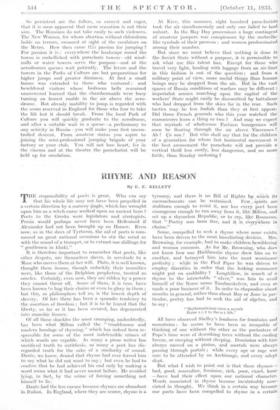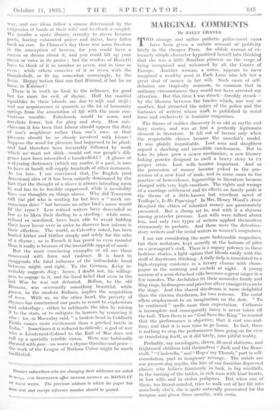RHYME AND REASON
By E. E. KELLETT
THE responsibility of poets is great. Who can say that his whole life may not have been propelled in. a certain direction by a nursery-jingle, which has wrought' upon him as a witch-curse worked upon an ancient hero ? Poets to • the Greeks were legislators and • strategists.
Persia would perhaps never have been Hellenised if Alexander had not been brought up on Homer. Even now, as in the days of Tyrtaeus, the aid of poets is sum- moned on great national occasions to stir the mind as with the sound of a trumpet, or to extract our shillings for " gentlemen in khaki." • It is therefore important to remember that poets, like other . despots, . are themselves slaves, in servitude to a Muse who moves them at her will. Plato, it is well known, thought them insane, though unluckily their insanities were, like those of the Delphian prophetess, treated as oracles. Certainly, even now, they are ridden by a power they cannot throw off. Some of them, it is true, have. beenknown,I,o hug their chains or even to glory in them.; .
but this, as philoSophers tell us, is the lowest depth of slavery. Of late there has been a sporadic tendency to the assertion of freedom.; but it is to be feared that the liberty, so. far as it has been secured, has degenerated into anarchic licence.
Of all these shackles the most cramping, undoubtedly, bas been what Milton called the •" troublesome and modern bondage of rhyming," which has indeed been re- sponsible for some of the most indefensible crimes of which words are capable. As many a prose writer has sacrificed truth to antithesis, so many a poet has dis- regarded truth for the sake of a similarity of sound.
Dante, we know, denied that rhyme had ever forced him to say what he did not want to say ; but even he had to confess that he had achieved his end only by making a word mean what it-had never meant before. He avoided lying, in fact, by the crime of forcing something not himself to lie.
Dante bad the less excuse because rhymes are abundant in Italian. In England, where they arc scarce, rhyme is a tyranny, and there is no Bill of Rights by., which its encroachments can be restrained. Few,.),'Spirits are stubborn enough to resist it, nor has every poet been courageous enough to run away from it, likb.Milton, and set up a rhymeleSs Republic, or to cry, like Rousseau, that " Poetry was born' free, and it is evcrYWhere in chains." .
Some, compelled to seek a rhyme where none exists, have been driven to the most, hiniliatink• devices. Mrs. Browning, for example, had to make children. bewildering and woman common. .,As for Mr. Breivning, 'who does not know how one Iltidibrastic rhyme drew him on to another, and betrayed him into the most wearisome' prolixity ; while in the Pied Piper he was driven to employ diacritics in order that the lurking assonance. might put on audibility ? Longfellow, in search of a rhyme to the intractable " silver," was fain to avail' himself of the Norse name Tainbarskelver, and even so. made a poor business df it. In order to rhapiodise about Months in general, rather than about May or June in par- ticular, poetry has had to seek the aid of algebra, and to say : " Mathematicians once a month Raise x + 1 to the n+ lth."
All have observed Shelley's fondness for fountains and mountains : he seems to have been ' as incapable of thinking of one without the other as the poetasters of Pope's- time were of describing trees without the cooling breeze, or creeping without sleeping. Dominion with him always moved on a pinion, and mortals were rage passing through portals ; while every age or rage was sure to be attended by an Archimage, and every adept slept.
But what I wish to point out is that these rhymes— bad, good, masculine, feminine, rich, poor, exact, loose ,have had their effect upon our national character. Words, associated in rhyme become inextricably asso- dated in thought. We think in a certain way because our poets have been compelled to rhyme in a certain Way, and 'out ideas follow a course determined by the exigencies of bards at their wits' end to clinch a couplet. We ascribe a quite illusory eternity to rivers beemise poets, haVing exhausted quiver and shiver, haVe fallen back on aer. In Chaucer's day there, was some freedom in the conception of heaven, for yoit could have a .Sweven dream about it, and you could lift up' Your steven or voice in its praise ; but-the readers of Rossetti have to think of it in number as seven, and. in time as even ; While others conceive of it as riven with the thunderbolt, or lit hp, somewhat annoyingly, by the levity IlaPpation that can find Himmel, if but for an hour, in l iircmel ! ' ThereiS in truth no limit to the influence, for geed but far More for evil, of rhyme. 'fah' the marital Squabbles' 4n 'these 'islands are due to wife and itrbre ; and our acquiescence in quarrels as the lot of humanity springs from the association of life with the same con- tentious vocable. Falsehoods would be rarer, and novelists fewer, but for glory and story. How mis- chievous it has been that labour should appear the duty of Ones, neighbour rather than one's own, or that pleasure should be so closely involved with leisure ! Suppose the Word for pleasure had happened to be plurk, and' hid therefore been invariably followed by work which' we-Must not shirk—Would not our people's dili- gence have been intensified a hundredfold ? A glance at a rhyming dictionary (which my reader, if a poet, is sure to have at hand) will supply hundreds of other instances. As for love, I am convinced thatii the English (and American) idea of it has been entirely dominated' by the fact that the thought of a shove is always intruding upon it, and has to be forcibly suppressed, while it inevitably fixes our thoughts on things above. Why did Tennyson call the'..girl Who is waiting for her hive a " meek un- conscious dove " but 'because no other bird's name would fit the :Verse? Less refined writers haVe descended' so love tolike4 their darling to a Starling ; while none, refined or unrefined, have been, able to avoid bidding their lover 'hover over in order to discover how intense is their affection.. The world, as Calverley noted, has been hurled hither and thither simply and solely for the sake of a rhyme ; as in Freneb it has posed as even rounder than it really is because of the irresistible appeal of sonde. But' the most convincing examples of all are those Concerned with force and violence. It is hard to exaggerate the fatal influence of the indissoluble" bond between might and 'right; To, the German, Krieg in- evitablysuggests Sieg ; hence, I doubt not, his willing- ness to .engage in it, and his fixed belief that even in the last War he was not defeated. Bellum, to the old Romans, was necessarily something beautiful, 'while guerra, to the modern Italians, implies the acquisition of terra. With us, on the other hand, the poverty of rhymes has constrained our poets to resort to euphemism and subterfuge ; either to sublimate the idea by raising it to the stars,, or to mitigate its horrors by removing it afar ; for, as Macaulay said, " a broken head in Coldbath causes more excitement than a pitched battle in India." ,ometimes it is reduced to ridicule; a god of war Who is Lieutenant-Colonel tothe, Earl of Mar does not call up a specially terrible vision. Were war habitually rhymed with gore—no worse a rhyme than love and prove— the work of the League of Nations Union might be much facilitated.































































 Previous page
Previous page